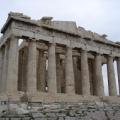26 - Ain't No Sunshine: The Cave Allegory of Plato's Republic
The most famous work of Plato is the "Republic" and its most famous passage is the allegory of the cave. In this episode Peter looks at the allegory, along with the Form of the Good and divided line.
Themes:
• N. Denyer, "Sun and line: the role of the Good," in G.R.F. Ferrari (ed.) The Cambridge Companion to Plato's Republic (Cambridge University Press: Cambridge, 2007), 284-309.
• G. Fine, “Knowledge and Belief in Republic V,” Archiv für Geschichte der Philosophie 60 (1978), 121–39.
• G. Fine, “Knowledge and Belief in Republic V–VII,” in S. Everson (ed.), Companions to Ancient Thought: Epistemology (Cambridge: Cambridge University Press, 1990), 85–115.
• G. Santas, "Two Theories of Good in Plato's Republic," Archiv für Geschichte der Philosophie, 57 (1980), 223–45.
• P. Shorey, “Idea of Good in Plato’s Republic,” in P. Shorey, Selected Papers (New York: Garland, 1980), 28-81.
Stanford Encyclopedia: Plato's Middle Period Metaphysics and Epistemology







Comments
Foundationalism?
Incidentally, I should perhaps add a caveat to this episode. The way I present the divided line section makes it sound as though Plato is endorsing a kind of foundationalism. This is the view that knowledge must be based on certain, unquestioned first principles. This is a widespread view of the divided line and Form of the Good, but another alternative view sees the Form of the Good as being something like the systematic interconnection of all the other Forms. According to this sort of line, Plato is endorsing a form of coherentism (i.e. the view that knowledge consists in having one's beliefs "hang together"). I actually find that reasonably plausible, but it seemed simpler to explain things in more foundationalist terms.
Justice
I am confused by the the use of the word 'Justice' for several different things:
1. Justice within an individual would seem to correspond to self discipline.
2. Justice when constrasted to the behaviour of Gyges would seem to mean morality.
3. Justice in the city described, in your words, as "the various classes doing what they are meant to do" doesn't seem to bear any relation to justice in an actual city which would normally refer to criminal justice.
4. And the term Justice when used to mean "the strong do what they will and the weak suffer what they must", that is the Law of the Jungle, disappears completely.
In none of these senses does justice seem to be the correct word, so why is it used by commentators?
In reply to Justice by Felix
Apparently it is down to poor
Apparently it is down to poor translation:
http://www.philosophy-index.com/terms/dike.php
That may sound harsh, but if the whole subject of the book is 'dikaisyne' and translators translate this concept in to a modern term such that the answer provided by Plato is utterly bemusing ... then I think the translators have been lazy. :-)
If the Greek word has multiple meanings in modern English then preferably use the Greek word throughout, or at least use the appropriate modern word in each context and indicate this to the reader.
In reply to Apparently it is down to poor by Felix
Justice by any other name
Hi Felix,
Sorry, I overlooked your earlier comment (I usually get a message when someone comments, so I can respond, maybe I missed it on this occasion). Anyway, yes, this is a somewhat notorious problem and some translations do use terms other than "justice" to render diakosune. I agree that being consistent is important -- the reader should at least be able to track the use of the same Greek word across passages. Of course in a sense, Plato himself tells us that it is unclear what the word means: already in Bk I of the Republic he has characters come up with radically different ideas of what it could mean! A similar problem arises, by the way, with sophrosune, the term usually translated "temperance" and chosen by Plato as the topic of the Charmides.
Peter
In reply to Justice by any other name by Peter Adamson
Further Definitions
Thanks Peter for your response late at night :-)
Here are some further definitions: https://secure.wikimedia.org/wiktionary/en/wiki/%CE%B4%CE%AF%CE%BA%CE%B…
If you happen to know of any good online articles on the meaning of the word and its confusions I would be glad to read them.
It just struck me that if the answer to the question is "mind your own business" then the question can't be very important! This thought led to the following which wasn't intended :-) ...
This mundane answer would seem to argue against Julia Annas' position that the book isn't about politics and the ideal state at all it is only about defining this word and any resemblance to unpleasant forms of government is purely coincidental.
I believe she also argues that the scale of forms of government that he outlines from his polis to timocracy, oligarchy, democracy and tyrany are ordered not as a comment on the real world value of democracy but only as a measure of the self-discipline required in the individual in each. Which is a good point.
It seems to me that the level of detail Plato goes in to about the organisation of the state, its education, drama and beliefs etc pretty much rule out these points. (As pointed out by Simon Blackburn).
Additionally his class status, family ties, apparent desire to dabble in politics in Syracuse and reason to dislike the democracy which killed Socrates add weight to the idea that he was an an admirer of what today we would call authoritarian forms of government such as the Spartan.
Anyway, you know all the arguments and I'm just testing myself/showing off/ or avoiding ironing my trousers in outlining them here :-) ...
But what do you think? Who's correct Annas or Popper?
In reply to Further Definitions by Felix
Real vs ideal forms of government
Hi Felix,
Yes, that's a really interesting issue. Not easy to sort out. Apart from the point I made in the podcast, that the agrarian "city of pigs" (which is obviously not totalitarian) is explicitly labelled as better than the city described in the rest of the Republic, I would say that Plato is always conscious of a distance between the theoretical outlines of a certain type of state, and the way that this state would actually be realized in practice. So in describing the just city he often alludes to constraints imposed by, basically, what you can get people to do and other material constraints. So actually I would say he is interested not just in an idealization/ethical structure, or in practical application, but in both. So he has three fish to fry: justice vs injustice in the individual, justice vs injustice in the abstractly considered city, and then the way that cities can actually come into existence.
Incidentally I would also say that he wants his readers to come away with certain messages that would be applicable to their immediate context, for instance when he has Socrates criticize the practice of Greeks enslaving Greeks in bk.5. That is clearly a plea that this practice should stop, which is basically independent of the question about bringing better/ideal states into being as a whole.
Peter
God, Soul and Mind
Peter, I wonder at the use of the terms God, Soul,and Mind in the translations of the Dialogues and if in the original Greek they share the same root? It seems for Plato that his notion (the Greek notion?) of God is foundational. He doesn't seem to question the concept, and his notion of Soul as being immortal has it somehow relating to the gods. Soul and body seem discrete but where is the mind? Does it belong to the body or is it a synonym for Soul?
In reply to God, Soul and Mind by Steadfast
God, soul and mind
Well, we'd need to look at each passage but generally speaking no, these words are not related. Usually "god" would translate theos (or ho theos), the root of "theology" etc. Soul translates psychê, the root of "psychology." And mind could translate several words but not usually one of these two; the most obvious would be nous.
It is not clear whether Plato distinguishes a "mind" as such from the rest of the human soul, as Aristotle does. Perhaps the closest he comes is distinguishing a rational part of the soul, but this may involve more than just mind. However he does sometimes speak of God as a mind (like in the Timaeus), or of mind in general as a principle of the cosmos; here he would be reacting to Anaxagoras, of course.
Does that help?
Plato cave allegory Republic | History of Philosophy without
You're so interesting! I don't think I have read through a single thing like this before.
So good to discover someone with a few original thoughts on
this subject matter. Really.. thank you for starting this
up. This site is one thing that's needed on the web, someone with a little originality!
In reply to Plato cave allegory Republic | History of Philosophy without by jacelyn oliver
Cave allegory
Thanks very much! Glad you enjoyed the episode.
Adamson's allegory comment
Peter Adamson wrote: "When the philosopher [former dweller-prisoner] goes back to the cave, he's not able to convert the prisoners to the truth just by talking to them. But this is not because the philosopher's knowledge is inexpressible or mystical. It is simply because the prisoners would never be able to understand or be convinced by the philosopher's account until they themselves engage in dialectic." So my question is this: with whom did the philosopher engange in (full-blown) dialectics? Is the answer to be 'Himself'?
In reply to Adamson's allegory comment by john m giannone
Dialectics
That's an excellent question. Of course the cave story also presupposes that prisoners can be freed, somehow - the philosopher himself was once a prisoner after all. One might suppose that being questioned by Socrates would be a good way to turn someone away from the shadows, but Plato seems to have become gradually dissatisfied with this form of dialectic. Elsewhere in the Republic, and in other dialogues, Plato discusses other forms of dialectic, and such things as using mathematics to get people to go towards the Forms. But he also emphasizes in many dialogues that the interlocutor must be open to engaging in dialectic - a Callicles or Thrasymachus may be too far gone to be converted to philosophy by even the best dialectical procedure. Anyway, Plato clearly thought deeply about the issue you are raising and his views on the matter seem to have evolved throughout his career.
Can gold souls fail?
Thanks for these excellent podcasts, Peter. They've really helped with my understanding of the Republic. There is one issue that's perplexing me as I work through book 7 of the dialogue, however, and that's whether all gold souls make it to guardian status or whether some fall by the wayside? As I understand it from the text, there are hurdles to overcome even if you're selected as a "gold souled" citizen in childhood, so I wonder what happens if you fail at age 20, 30, 35 or 50? Is that possible, and does it mean you get downgraded to a silver or bronze soul?
In reply to Can gold souls fail? by David Redford
Gold souls
Good question. Actually Plato does talk about "demoting" people who do not pass the rigorous tests conducted at an early age, to be in the philosopher or guardian class - in the terms of the metals from the noble lie this would mean testing someone to see if their souls are really golden or rather silver/bronze. Also in the end the failure of the eugenics lottery means that the rulers are corrupted, so things can go wrong in that way too.
In reply to Gold souls by Peter Adamson
Thanks for your reply,
Thanks for your reply, appreciate it. To my mind, the fact that people can drop down a level or two in this 3-tier system is a serious flaw in its conception, given that the basis of S/P's depiction of the ideal city (and, by analogy, the soul) is the idea of fixed qualities from birth (bronze, silver and gold). But then again, who am I to question Plato!
In reply to Thanks for your reply, by David Redford
Demotion
But insofar as the stability of the three classes is ensured purely through genetic inheritance, isn't it if anything a point in Plato's favor that he recognizes that this inheritance needs to be double-checked by testing the kids? Since we aren't generally impressed by eugenics today, it would be nice if Plato didn't put so much faith in it!
In reply to Demotion by Peter Adamson
Demotion
It seems to me that back then, folks had a much higher regard for consistency. Maybe not necessarily personally but due to the times/culture? If you were bronze at a young age-you were more likely to be bronze forthwith. There were not as many options to sway a persons bronzeness back then?
Please. Forgive my verbiage, im not perfect. ;0)
Add new comment